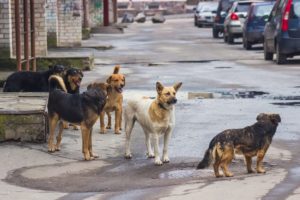July 19, 2019

A Tehran suburb will try to control the problem of stray dogs by setting up feeding stations for them outside residential areas, in hopes that will keep them away from people.
The plan was prompted by the overpopulation of stray dogs in Damavand County, northeast of Tehran, the Iranian Students News Service (ISNA) reported.
Stray dogs may be pets that have wandered off or been abandoned by their owners, or they may be feral animals that have never been owned. Such street dogs are a common problem in most Iranian cities.
Many municipalities have collected the stray dogs for vaccination and sterilization, but it is not possible to release them near urban areas even after vaccination and sterilization, an animal rights advocate, Amin Behdad, told ISNA.
Efforts to kill strays raise many objections and sometimes cause other problems. Decades ago, Tehran police offered a bounty for strays that were turned in, but the police discovered that teens were capturing strays and breeding them, then handing in the litters for the bounty.
Behdad and his associates proposed that strays be released after sterilization and vaccination at certain locations outside residential areas, where food stations would be created to prevent them from heading to residential areas searching for food.
Some locations around urban areas will be covered with plants and seedlings for such dogs, under the scheme, Behdad said.
He went on to say that feral dogs are not a threat to humans after vaccination and sterilization. In addition, they are necessary in urban areas as they prevent other animals entering cities, such as hyenas and wolves.
Under the scheme, some 25 food stations are scheduled to be set up around Damavand County.
After collecting the dogs, they stay in a center for two to three days to receive medical care, and then are released at the defined locations.